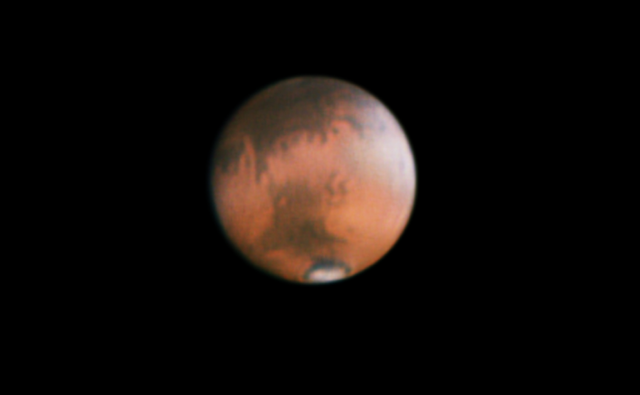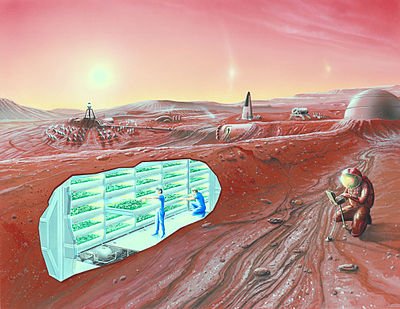Have you ever pondered what life was like in the Age of Discovery? What was it like to risk everything and sail into the unknown across massive oceans, explore an entire continent unknown to your civilization, and meet people so different and isolated they may have seemed almost.. alien?
Unfortunately, this is a privilege that few of us will ever experience, particularly that last bit. Effectively all land above sea level has been discovered and claimed as sovereign territory of governments. Unless you intend to deep sea dive (where even still, some land is claimed by governments), there's little/nothing left to be discovered for the first time, on Earth's surface. However, a new Age of Discovery may be at hand.
Since the initial development of modern rocket technology in the 1940's, we have come a long way. We have landed humans on another celestial body, and we're closer than ever to putting another notch on our belt. Even more exciting, this time it won't be just a hit and run mission. We will be going, and staying.
Of course, I'm talking about Mars.

Current organizations planning Mars missions include NASA, ESA, Roscosmos, CNSA, MarsOne, and SpaceX. Most of these are government organizations, but I'd like to focus on NASA, MarsOne, and SpaceX as they're the only ones planning true colonies on Mars.
NASA intends to set up a Mars colony in the 2030's, Antarctica style. Infrastructure will be built at their chosen location and colonists will be alternated periodically. Their intent is to prove the technology, having the colony Earth-reliant at first, while gradually shifting to Earth-Independent. Much can be said for this approach, as it may be necessary to withdraw Martian colonists for any number of reasons, and it's unlikely that the very first colony will be capable of true resource independence. So having a terrestrial umbilical cord is practical.
However, NASA is a dog on the leash of Congress and the POTUS, and therefore not a reliable custodian of humanity's interplanetary ambitions in my opinion. They may get it done eventually, but by then I will probably be old enough to retire on Mars without their help.

SpaceX has plans in the works to develop the very terrestrial umbilical cord I just mentioned. They have dubbed it the ITS (Interplanetary Transport System), capable of being used to transport supplies and people to any planet in the solar system. This is absolutely vital to any serious attempt at Mars colonization.
While I believe SpaceX intends to keep their business primarily in transit between, or in orbit of Earth and other planets, they have implicitly stated they intend to begin launching the ITS in 2024 if everything goes according to plan. Elon Musk, SpaceX's CEO, has stated it is his personal goal to help create a self sustaining city on Mars, with a population of 1 million.
Last (my favorite, barely) MarsOne. This organization is an oddity for sure. MarsOne, founded by Bas Lansdorp. It's goal is to send 6 successive groups of 4 colonists, selected through 4 selection rounds of increasing difficulty, with the option of sending more groups after the initial 24 are sent.
The real kicker here is that skills people would typically need to be an astronaut are not a prerequisite. Of course the selected applicants go through training, but an 18 year-old fresh out of school with no life experience could still be selected for the most important journey in the history of humankind. Upon sending their freshly trained colonists on a one way mission, MarsOne intends to fund this colony via media exposure, creating a reality TV show about the life and death struggle of the first Martian colonists.
This almost sounds like it is in an Onion article, but this is real. Maybe.
There have been rumors floating around that MarsOne is a hoax, or scam, and that wouldn't be too difficult to believe (But I truly hope not). Allegations have been made that the amount donated by specific applicants was a factor in who was selected. Additionally, it started as a non-profit, but then merged with a for profit financial organization. & The cherry on top, the launch date has been delayed multiple times, the original manned launch was scheduled for 2022, and has now been delayed to 2027.
These could all be desperate attempts to gain the funding necessary for a venture of this magnitude, but you never know. I am personally rooting for all of these organizations to achieve their martian ambitions, as I could totally see myself retiring to Mars, looking out the window of my bunker excavated from the side of Olympus Mons, & eating a Mars bar.
What do you think? Would you go to Mars? Would you watch a Martian reality TV show? Would you invest in any of these companies? What would you do on Mars? Let me know in the comments, and thank you for reading.
-Knox
Sources:
nasa.gov
space.com
spacex.com
marsone.com
wikipedia.com
Cool post rotaiva! I think these early colonies will be like the first ones set up in the new world. By that I mean extremely prone to failure. But, still, worth it.
Anyways, I like your stuff and I am your newest follower!
Downvoting a post can decrease pending rewards and make it less visible. Common reasons:
Submit
Thanks! (:
I'm glad you liked it, I'll have more for you soon.
Downvoting a post can decrease pending rewards and make it less visible. Common reasons:
Submit
wow, colonize mars instead of the moon, very smarts. The insanity of this and the obviousness of "WHY".
Downvoting a post can decrease pending rewards and make it less visible. Common reasons:
Submit
Why not both? (:
There are certainly pros and cons of both options, perhaps I'll write an article on moon vs mars colonization.
Any suggested input?
Downvoting a post can decrease pending rewards and make it less visible. Common reasons:
Submit
So you are really asking why you would not go to both the moon and mars?
Downvoting a post can decrease pending rewards and make it less visible. Common reasons:
Submit
I absolutely am.
I'm not as gung-ho colonize Mars as many people are. I think there are better options of which the moon is included in, but everyone is focused on Mars & I'd still love to see them succeed.
Downvoting a post can decrease pending rewards and make it less visible. Common reasons:
Submit
Why would you go to somewhere that is 140 million miles instead of 238,900 miles? That is a difference of 580 trips vs 1.
Downvoting a post can decrease pending rewards and make it less visible. Common reasons:
Submit
At this point you might as well say "colonize the moon, that one asteroid and everything else, because, mars". It makes NO SENSE. No, asking me why not doesn't make it any more rational. Ever.
Downvoting a post can decrease pending rewards and make it less visible. Common reasons:
Submit
Fair enough. There are many other factors in which Mars is better and the moon is worse, or vice versa. That is a good point though. It is far as hell.
Thanks.
Downvoting a post can decrease pending rewards and make it less visible. Common reasons:
Submit